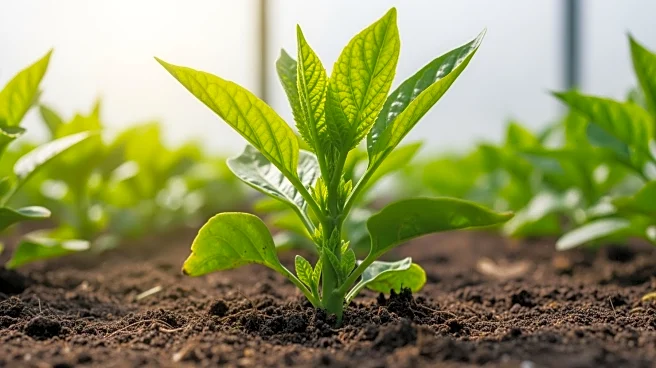What's Happening?
Brazilian soil scientist Mariangela Hungria was awarded the 2025 World Food Prize for her pioneering work in biological nitrogen fixation, which utilizes symbiotic soil microorganisms as an alternative to synthetic fertilizers. The award ceremony, held
in Brazil, was presided over by Iowa Governor Kim Reynolds and attended by notable figures including H.E. Jane Naana Opoku-Agyemang, Vice President of Ghana. Hungria's work has significantly increased crop productivity while reducing environmental impact, aligning with the vision of a 'MicroGreen Revolution.' Her contributions have enabled farmers to save billions and mitigate agriculture's climate footprint. The event also featured performances by Tony Award-winning actress Adrienne Warren and a traditional Brazilian Samba group.
Why It's Important?
Hungria's recognition underscores the critical role of sustainable agricultural practices in addressing global food security and environmental challenges. Her innovations in biological nitrogen fixation offer a viable solution to reduce reliance on chemical fertilizers, which are often costly and environmentally damaging. This advancement is particularly significant as it supports sustainable farming practices that can be adopted globally, enhancing food production while preserving natural resources. The award highlights the importance of investing in agricultural research and development to tackle issues such as soil degradation and climate change, benefiting farmers, consumers, and the environment.
What's Next?
The World Food Prize will celebrate its 40th anniversary in 2026, continuing to honor individuals who contribute to global food security and sustainable agriculture. Hungria's work is expected to inspire further research and innovation in the field, encouraging more scientists and policymakers to focus on sustainable solutions. The ongoing dialogue about soil-centered solutions, as discussed in panels at the event, will likely influence future agricultural policies and practices, promoting resilience against global challenges.
Beyond the Headlines
Hungria's achievements highlight the potential of biological solutions in agriculture, which could lead to a paradigm shift away from chemical-dependent farming. This approach not only supports environmental sustainability but also aligns with global efforts to combat climate change. The recognition of her work may encourage more investment in similar technologies, fostering a new era of agricultural innovation that prioritizes ecological balance and long-term food security.

















